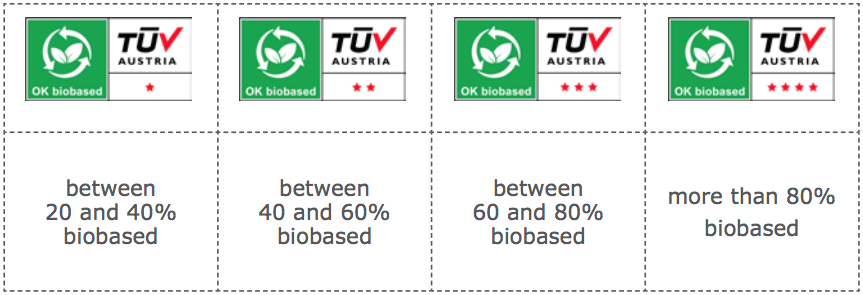TÜV AUSTRIA’s OK Biobased Labeling Program
- The OK biobased label uses a star system to indicate a certified product’s biobased content – the more stars, the higher the biobased content.
- This labeling program applies to basic/raw materials, intermediates, and finished products with at least 30% total carbon and 20% biobased carbon content.
- The OK biobased certification cannot be used to make claims of compostability and biodegradability.
OK biobased’s Star System & Certification Process
A one-star biobased product has biobased content between 20% and 40% while a four-star certified product has a biobased content greater than 80%.

Source: TUV Austria Belgium Renewable Materials Conference. nova-Institute.
To start the application, submit a completed form on the TÜV AUSTRIA website.
Fast Facts:
| Product Eligibility |
|
| Basic Requirements | Each product must meet these two requirements:
|
| Number of measurements required | 3 measurements per parameter (biobased carbon content, total carbon) |
| Certification Validity | 5 years |
Source: OK biobased certification scheme
NOTE: SGS Beta is not affiliated with testing and certification company TÜV AUSTRIA or its OK biobased scheme. Interested parties are welcome to contact SGS Beta on how to submit samples for biobased carbon testing.
Biobased Carbon Content Testing at SGS Beta
ISO/IEC 17025:2017-accredited SGS Beta supports the biobased industry by providing accurate EN 16640 analysis. Based in Miami, Florida, the lab has forwarding offices in Europe (Dusseldorf, Germany; Madrid, Spain; London, UK) and Asia (Xiamen, China; Nagoya, Japan; Seoul, South Korea, and Taipei, Taiwan).
We provide two services for biobased carbon testing:
* Standard (results are reported in 7 business days or less), and
* Priority (4 business days or less).
Page Last Updated: April 2025